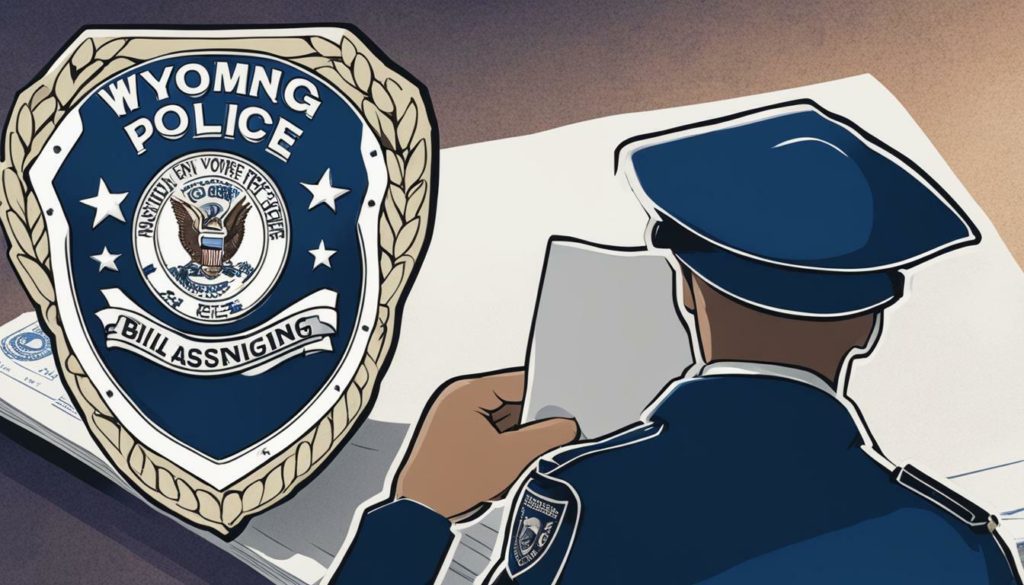
As a citizen of Wyoming, it’s crucial to understand your rights when it comes to police arrests. During encounters with law enforcement, you have certain rights that are designed to protect your individual liberties. Knowing and exercising these rights can help ensure a fair and just process. Here are some key points to keep in mind:
Key Takeaways:
- Wyoming citizens have the right to remain silent during a police arrest.
- You have the right to refuse a search of yourself, your car, or your home without a warrant.
- If you’re not under arrest, you have the right to leave calmly.
- If arrested or undergoing custodial interrogation, you have the right to a lawyer.
- These rights apply to all citizens, regardless of immigration or citizenship status.
It’s important to familiarize yourself with these rights to protect yourself and ensure a fair interaction with law enforcement. Whether you’re stopped on the street, during a traffic stop, or at your home, understanding your rights can make a significant difference in how you navigate these situations.
Understanding Wyoming Police Arrest Rights and Procedures
When encountering law enforcement in Wyoming, it’s important to familiarize yourself with the specific rights and procedures that govern police arrests in the state. Wyoming citizens have certain rights when facing arrest, regardless of immigration or citizenship status. By understanding these rights, you can protect yourself and ensure that your interactions with law enforcement are fair and just.
First and foremost, you have the right to remain silent. If stopped by the police, you can choose not to answer any questions. It’s important to remember that anything you say can and will be used against you in a court of law. By remaining silent, you avoid providing any potentially self-incriminating information.
You also have the right to refuse a search of yourself, your car, or your home. In Wyoming, law enforcement officers must obtain your consent, have a search warrant, or conduct a search incident to arrest in order to perform a search. If an officer asks to search you or your property, you have the right to clearly state that you do not consent. This protects your privacy and ensures that searches are conducted within the bounds of the law.
If you are arrested or undergoing custodial interrogation, you have the right to a lawyer. This means that you can request to speak with an attorney before answering any questions from law enforcement. It’s essential to exercise this right in order to protect your legal interests and ensure that your rights are upheld throughout the legal process.
Whether you are stopped on the street, pulled over during a traffic stop, or faced with law enforcement at your home or workplace, knowing your rights and procedures is crucial. By staying informed and prepared, you can navigate police encounters with confidence and ensure that your rights are respected.
FAQ
Q: What rights do Wyoming citizens have when encountering law enforcement during an arrest?
A: Wyoming citizens have the right to remain silent, refuse a search of themselves, their car, or their home, and have the right to leave calmly if not under arrest. They also have the right to a lawyer if arrested or undergoing custodial interrogation. These rights apply to all citizens, regardless of immigration or citizenship status.
Q: Can individuals ask law enforcement officers if they are free to go when stopped on the street?
A: Yes, if stopped on the street, individuals can ask the officer if they are free to go. If detained, they can remain silent and provide basic identification information if required by state law.
Q: What can officers search during a frisk?
A: Officers can conduct a frisk on the outside of an individual’s clothing but cannot search inside pockets or bags without consent. If an officer extends the frisk or attempts to search, individuals can clearly state that they do not consent.
Q: When can law enforcement perform a search?
A: Consent, search incident to arrest, and search warrants are the three instances in which law enforcement can perform a search.
Q: What should individuals do during a car stop?
A: During a car stop, individuals should turn off the car, keep their hands visible, and provide required documents such as driver’s license, registration, and proof of insurance when asked. Passengers also have the right to remain silent.
Q: Can individuals refuse entry to law enforcement officers at their house?
A: Yes, individuals have the right to refuse entry to law enforcement officers at their house unless officers have a search warrant or arrest warrant. Consent, arrest warrants, and search warrants are the three exceptions to the warrant requirement.
Q: What should individuals do if arrested?
A: If arrested, individuals can ask to speak to a lawyer and do not have to sign anything without reading it first.
Q: Are there measures to take when interacting with police or immigration officers in public?
A: Yes, individuals can calmly ask to leave or present an attorney’s card when interacting with police or immigration officers in public.
Source Links
- https://www.uwyo.edu/studentatty/legal-information-by-topic/criminal-law-know-your-rights-.pdf
- https://www.aclu-wy.org/sites/default/files/field_documents/final_know_your_rights_booklets_for_aclu_wyoming_police_interactions.pdf
- https://law.justia.com/codes/wyoming/2022/title-7/chapter-3/article-2/section-7-3-214/